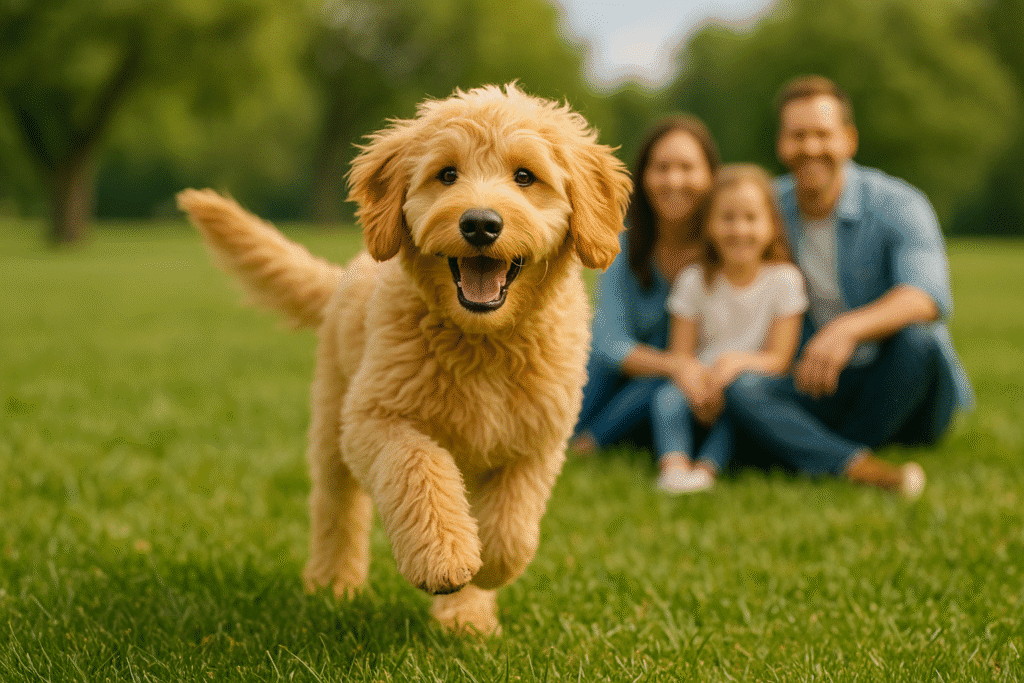Discover everything you need to know in this Goldendoodle Care Guide — from their affectionate personality and training essentials to grooming routines and common health issues. Learn how to raise a happy, well-balanced Goldendoodle that will fill your home with love and joy.
Introduction: Why Everyone Loves the Goldendoodle
The Goldendoodle — a cross between the intelligent Poodle and the loyal Golden Retriever — is one of the most beloved designer breeds today. With their friendly personality, hypoallergenic coat, and playful energy, Goldendoodles have become a top family choice worldwide. This Goldendoodle Care Guide will help you understand their unique temperament, grooming demands, exercise routines, and health considerations to ensure your pup lives a long, joyful life.
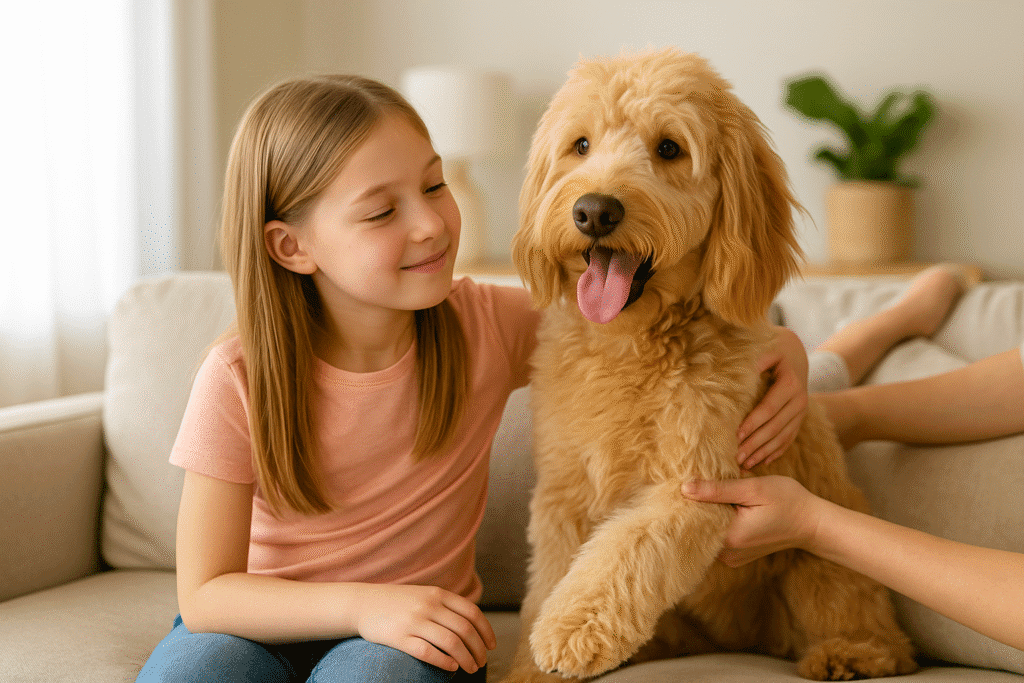
Goldendoodle Personality: Intelligent, Loving, and Social
1. A Perfect Family Dog
Goldendoodles are known for being affectionate and gentle, making them ideal for families with kids or other pets. Their sociable nature means they rarely meet a stranger they don’t like. Whether playing in the yard or cuddling on the couch, they thrive on companionship and positive attention.
2. Intelligence and Trainability
Thanks to their Poodle lineage, Goldendoodles are among the smartest breeds. They quickly pick up commands and excel in obedience training. Early socialization and consistent routines make a world of difference in shaping their behavior. Using positive reinforcement and short, fun sessions keeps them engaged and eager to learn.
3. Emotional Sensitivity
Goldendoodles are highly attuned to their owners’ moods. They can sense when you’re happy, stressed, or sad — and respond accordingly. This makes them excellent therapy and emotional support dogs. However, this same sensitivity means they don’t handle harsh corrections well. Instead, patience and praise are key.
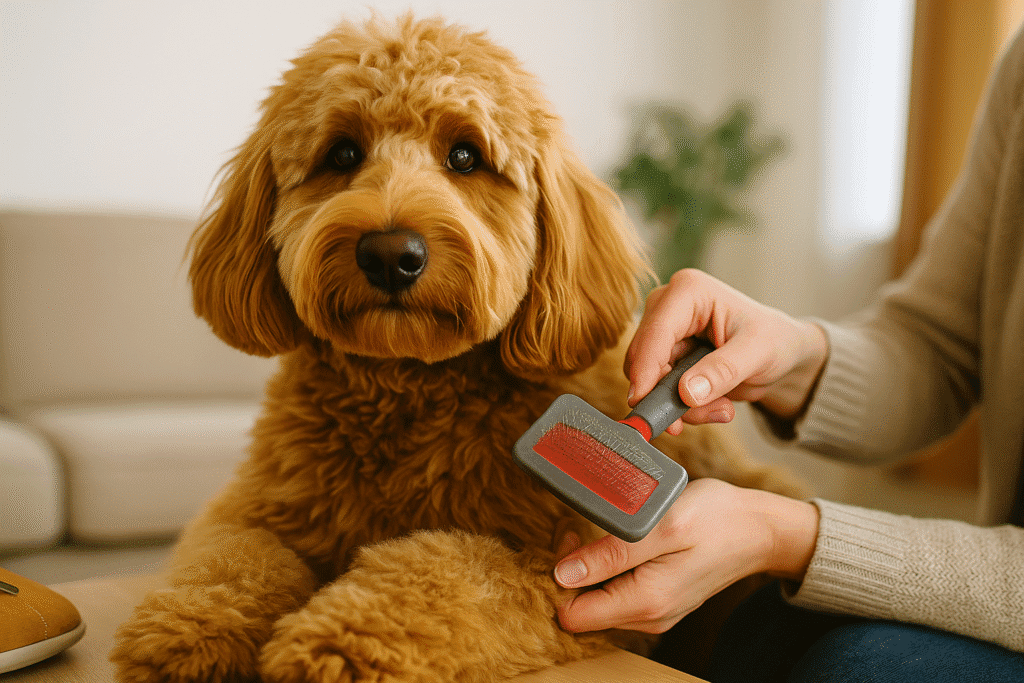
Goldendoodle Grooming Guide: Keep That Fluffy Coat Beautiful
1. Understanding Their Coat Type
Goldendoodles have coats that range from straight (like a Retriever) to tight curls (like a Poodle). The most common type is wavy, which offers a great balance — soft, low-shedding, and easy to maintain. Regular grooming prevents matting and helps distribute natural oils that keep their coat healthy and shiny.
2. Brushing Routine
Brush your Goldendoodle at least three times per week using a slicker brush and a detangling spray. For curly coats, daily brushing might be necessary. Start early so your pup becomes comfortable with grooming sessions.
3. Professional Grooming & Trimming
Scheduling professional grooming every 6–8 weeks is essential. Ask your groomer for a “teddy bear cut” — a popular choice that highlights their adorable face. Regular trimming around the eyes, ears, and paws prevents dirt buildup and irritation.
4. Bathing Tips
Bathe your Goldendoodle every 4–6 weeks with a mild, pH-balanced dog shampoo. Overbathing can strip their coat of natural oils. Make sure to rinse thoroughly and brush out any tangles after drying.
5. Ear, Teeth, and Nail Care
- Ears: Clean weekly with a vet-approved ear cleaner to prevent infections.
- Teeth: Brush 2–3 times per week using dog-safe toothpaste.
- Nails: Trim monthly to avoid discomfort and mobility issues.
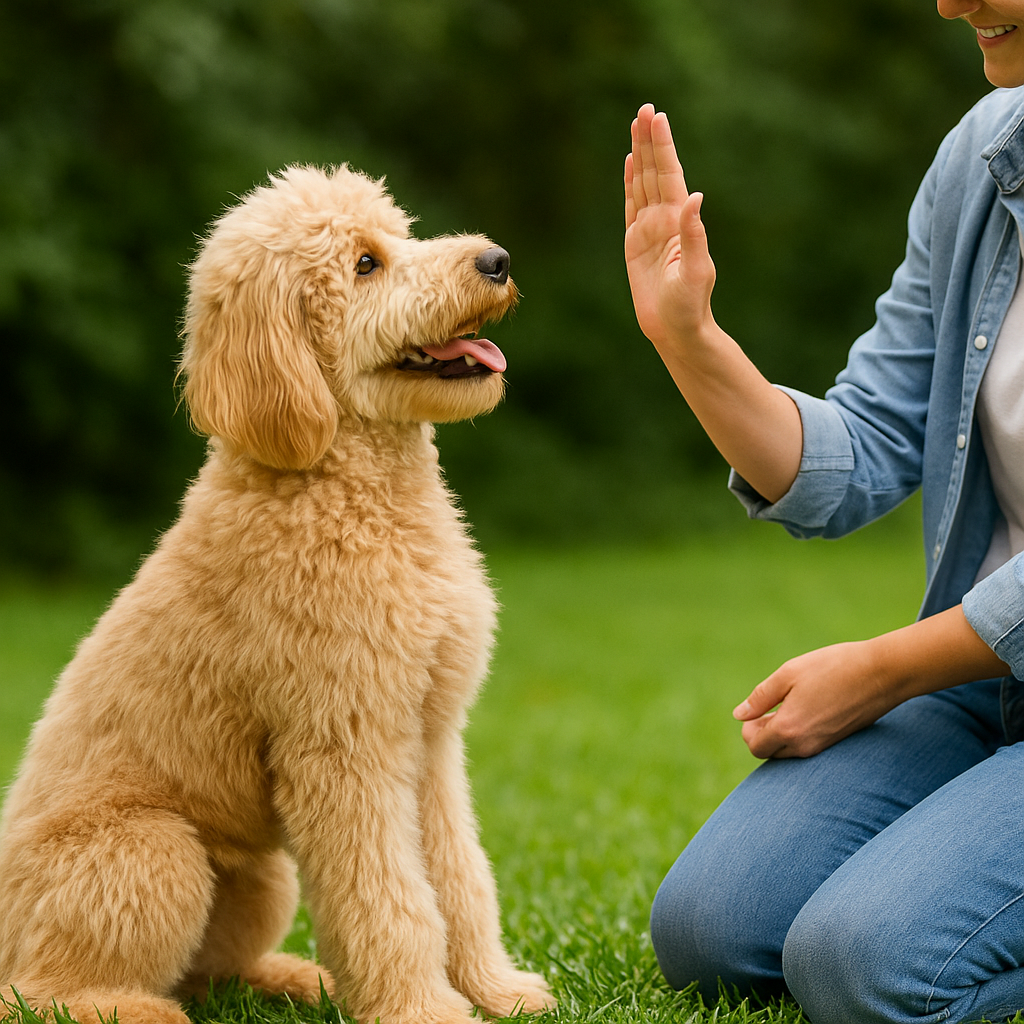
Training Your Goldendoodle: Smart Minds Need Consistency
1. Early Puppy Training
Start training your Goldendoodle as early as 8 weeks old. Introduce crate training and basic commands like “sit,” “stay,” and “come.” Keep sessions short (5–10 minutes) to match their attention span. Reward good behavior instantly with treats and praise.
2. Socialization
Expose your Goldendoodle to different people, dogs, sounds, and environments. Early socialization reduces fear-based behaviors and ensures they grow into confident, friendly adults. Puppy classes are an excellent way to reinforce positive interactions.
3. Exercise and Mental Stimulation
Goldendoodles are energetic dogs. They require at least 60–90 minutes of daily activity. Combine walks, fetch, and swimming with brain games like puzzle feeders or scent-based play. Without proper stimulation, they may resort to destructive habits like chewing or digging.
4. Avoiding Separation Anxiety
This breed forms deep bonds with its owners, which can lead to anxiety when left alone. Gradually increase alone time, provide interactive toys, and use calming aids if necessary. You can also explore crate training techniques in our crate training guide.
Goldendoodle Diet and Nutrition: Feed for Health & Longevity
1. Choosing the Right Food
A balanced diet is essential in any Goldendoodle Care Guide. Opt for high-quality dry kibble with real meat as the first ingredient. Avoid fillers like corn or soy. Puppies need a protein-rich diet (22–30%), while adults require 18–25% protein for maintenance.
2. Feeding Schedule
Feed puppies three times a day until six months old, then transition to two meals daily. Consistency helps regulate digestion and prevents overeating.
3. Supplements
Consider adding joint supplements with glucosamine and omega-3s to support bone health. Probiotics can aid digestion, especially for dogs with sensitive stomachs.
4. Treats and Snacks
Limit treats to 10% of daily calories. Use low-fat, high-protein treats for training. Homemade snacks like boiled chicken or carrots make healthy alternatives.
Health & Common Issues in Goldendoodles
While generally healthy, Goldendoodles can inherit conditions from either parent breed. Regular vet visits and early detection are key to prevention.
- Hip Dysplasia: Maintain proper weight and use joint supplements.
- Ear Infections: Due to floppy ears; regular cleaning prevents bacteria buildup.
- Allergies: Watch for itching or red skin. Use hypoallergenic food if needed.
- Bloat (GDV): Feed smaller, frequent meals and avoid vigorous exercise after eating. VCA Hospitals — GDV (Bloat) in Dogs
- Eye Conditions: Regular vet check-ups help detect progressive retinal atrophy early.
Exercise Needs: The Key to a Happy Goldendoodle
Goldendoodles love outdoor adventures. Take them for hikes, swimming, or agility training sessions. Physical activity not only maintains a healthy weight but also strengthens your bond.
Recommended Routine
- Daily walk: 45–60 minutes
- Playtime: 20 minutes of fetch or tug-of-war
- Brain games: 15 minutes of puzzle toys
Living With a Goldendoodle: Is It Right for You?
If you’re looking for a dog that’s loving, intelligent, and family-friendly, the Goldendoodle fits perfectly. They do best in active households and thrive on attention. However, be prepared for regular grooming and exercise — they’re not the best fit for sedentary lifestyles.
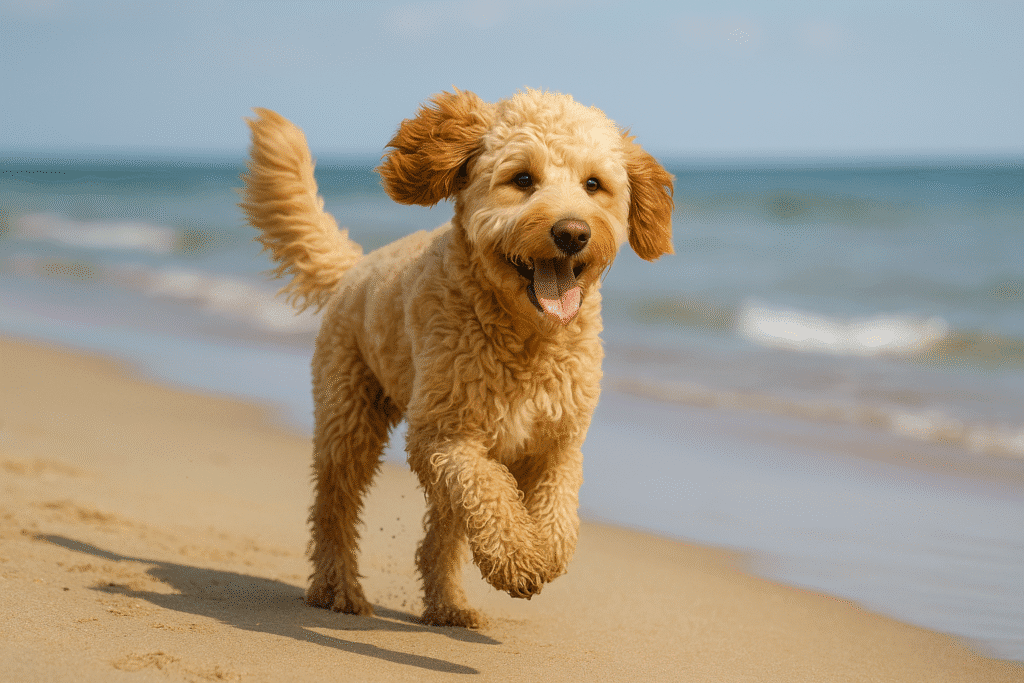
Frequently Asked Questions (FAQ)
1. Are Goldendoodles hypoallergenic?
They’re low-shedding but not completely hypoallergenic. Allergy sufferers may still react to dander or saliva.
2. How often should I groom my Goldendoodle?
Brush several times per week and schedule professional grooming every 6–8 weeks.
3. Do Goldendoodles bark a lot?
They’re moderate barkers — usually to alert or express excitement. Proper training can minimize excessive barking.
4. What size do Goldendoodles come in?
They come in three sizes: Mini (15–30 lbs), Medium (30–45 lbs), and Standard (45–80 lbs).
5. How long do Goldendoodles live?
The average lifespan is 12–15 years with proper care, diet, and regular exercise.
Final Thoughts: Why You’ll Love the Goldendoodle
In this Goldendoodle Care Guide, we’ve explored what makes this breed one of the most lovable companions around. Their affectionate nature, intelligence, and joyful personality make them the perfect match for any family. With the right training, grooming, and diet, your Goldendoodle will bring endless happiness for years to come.
👉 Explore more breeds like the Labrador Retriever and Poodle here!

